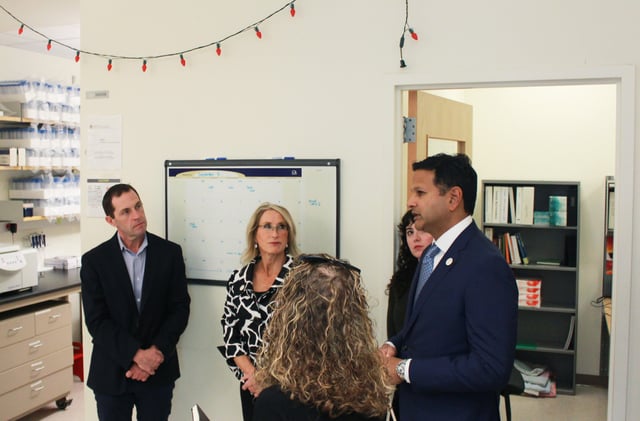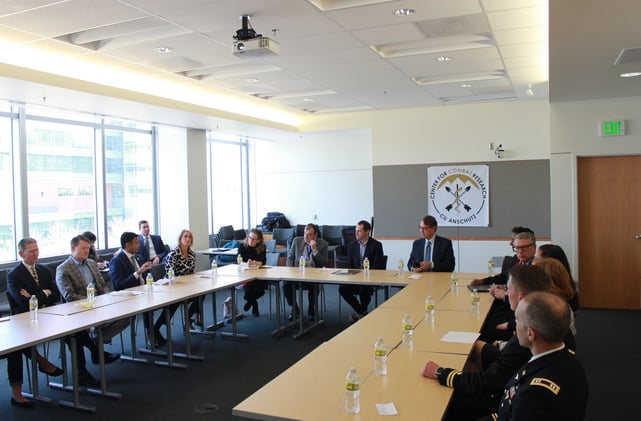U.S. Rep. Jason Crow visited the University of Colorado Anschutz Medical Campus on Monday to learn more about current programs and research on the campus that address the U.S. military’s medical needs, including solutions in combat casualty care, critical and emergency care, surgical trauma, and acute mental health. The Center for Combat Medicine and Battlefield (COMBAT) Research hosted the visit that included additional CU leadership and research groups for a supportive discussion on current military medical challenges.
The visit with Crow, who is a former Army Ranger and current member of the Armed Service Committee, highlighted the importance of creating scientific breakthroughs that provide critical care for service members on and off the battlefield.
COMBAT's leadership, including Colonel Vik Bebarta, MD, and Brigadier General (Ret) Kathleen Flarity, DNP, PhD, helped guide discussion during the visit and provided Crow with information on the progress the center has made over the past few years.
“Our work exists to change policy and practice that benefits both military and civilian communities, so we are grateful the center’s mission matches Rep. Crow’s larger vision and interest area for national security,” says Bebarta, director for COMBAT and professor of emergency medicine at the CU School of Medicine.
Elevating breakthrough science to save lives
Crow visited two labs that showcased the direct impact research can have on combat and civilian medical care, both focused on trauma solutions.
The Translational Research, Innovation, & Antidote Development (TRIAD) team discussed their research on evaluating alternate administration routes of FDA-approved medications that have been shown to reduce bleeding and how the work is relevant to both military and civilian trauma patients. Identifying a route of drug administration that is effective and easy to administer by first responders or bystanders with minimal or no training can reduce the need for blood transfusions, leading to improved patient outcomes and ultimately saving lives.
“Through our research, we hope to bring evidence based, real-world approaches to the military and local community,” says Tara Hendry-Hofer, MSN, RN, program manager for TRIAD.

Bebarta (right) speaks to Rep. Crow (left), Flarity (center), and Regent Ilana Spiegel (front) during the TRIAD lab tour.
Mitchell Cohen, MD, professor of surgery and principal investigator for the Trauma Research Center, led Crow through his lab, which employs a multidisciplinary approach to trauma-induced coagulopathy and inflammation to decrease morbidity and mortality for those who are critically injured. The Trauma Research Center is a leader in trauma resuscitation. Cohen and surgical residents shared how physical trauma can damage the endothelium of blood vessels and cause vascular leak, which can injure lungs and kidneys.
Amplifying current research for accelerated military support
At a roundtable discussion highlighting the importance of partnerships and expanding research that solves real-world issues on the battlefield, COMBAT and the Trauma Research Center leadership team were joined by John J. Reilly Jr., MD, dean of the CU School of Medicine; Thomas Flaig, MD, vice chancellor for research at the CU Anschutz Medical Campus; CU Regent Ilana Dubin Spiegel; Robert McIntyre, MD, chief of GI, Trauma, and Endocrine Surgery in the Department of Surgery; Lieutenant Commander Ian Eisenhauer, MC, USN, emergency medicine research fellow; and Captain Matt Paulson, COMBAT scholar.
Bebarta discussed COMBAT’s deployment and operational research model, which focuses on supporting service members at each stage of deployment to address their pressing medical challenges. Adit Ginde, MD, MPH, principal investigator for Airway, Trauma, Lung injury, and Sepsis Research (ATLAS), shared research on oxygen conservation tactics for trauma patients, sepsis-induced hypotension, and airway intubation.
Julia Dixon, MD, MPH, co-investigator for the C3 Global Trauma Network: Cape-Colorado-Combat, gave an overview on global impact and military collaboration, and Emmy Betz, MD, MPH, director of the Firearm Injury Prevention Initiative, presented on current projects related to mental health for veterans.
The discussions and presentations led Crow to speak of his concerns about the ongoing conflict in Ukraine and its critical trauma needs, which highlights the importance of COMBAT’s research to improve care in current and future battlefields for large-scale combat operations.

Bebarta (third from left) speaking during the roundtable discussion.
Strengthening partnerships
With current partnerships with the Defense Health Agency, Department of Defense, active-duty military commands, hospitals, and industry partners, COMBAT plans to continue conversations with Crow on working together and expanding research to save lives in combat and civilian communities.
“We are grateful for the opportunity to share the high-impact work of our academic investigators with Rep. Crow and look forward to continue being the leader in solving current and future relevant U.S. military medical challenges,” says Bebarta.




